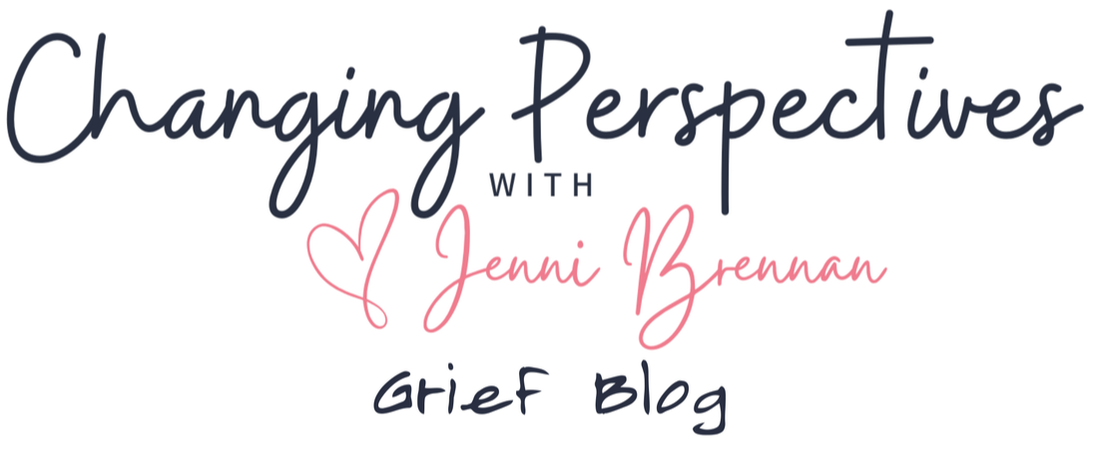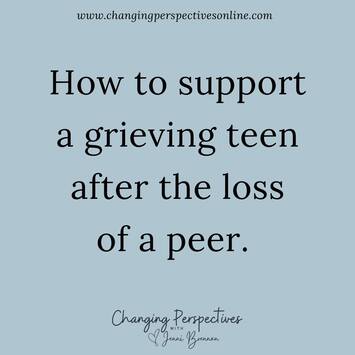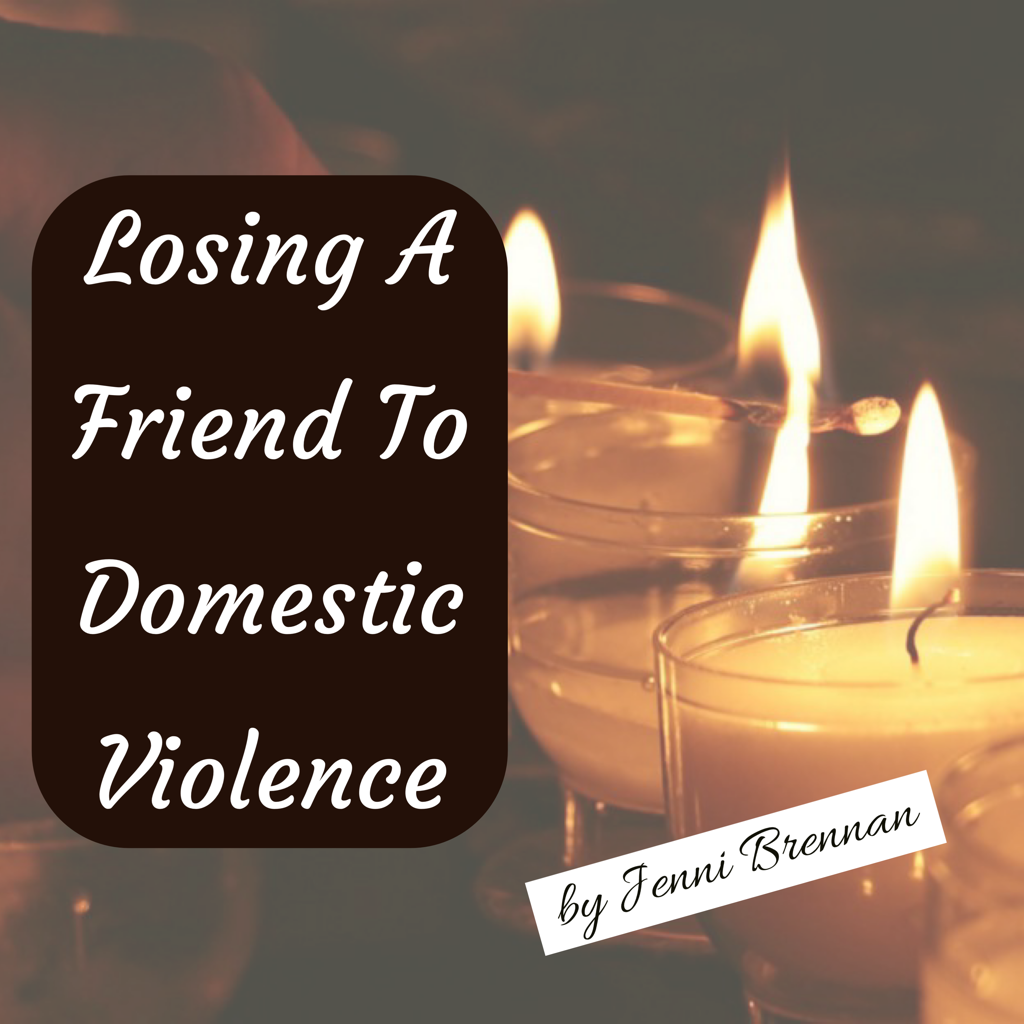|
Lots of people reached out to me over the past few days asking for some advice and insight on how to support their grieving teens after the sudden and tragic death of their peer. Sadly, teens in my own town are not the only ones who are or will face the challenges of grieving while being a teenager.
Rather than keep my suggestions hidden within some texts and dms, here are some tips and strategies for parents who are trying to navigate their way through the heartbreaking maze of supporting their grieving teen after a loss. While this list is certainly not exhaustive, my hope is that it offers some tangible tools for anyone who loves a grieving teen. 𝟏. 𝐍𝐨 𝐓𝐰𝐨 𝐓𝐞𝐞𝐧𝐬 𝐆𝐫𝐢𝐞𝐯𝐞 𝐀𝐥𝐢𝐤𝐞 Teen grief, like much of adolescence, is messy, unpredictable, and very unique. There is no one-size-fits-all approach when it comes to supporting grieving teens. So it’s most important to tune into your own teen. Who are they? What do they need? How have they typically handled difficult times in the past? What are they asking for right now (both in words and in actions)? 𝟐. 𝐑𝐞𝐬𝐢𝐬𝐭 𝐓𝐡𝐞 𝐓𝐞𝐦𝐩𝐭𝐚𝐭𝐢𝐨𝐧 𝐓𝐨 𝐂𝐨𝐦𝐩𝐚𝐫𝐞 One of the most hurtful things our society does in times of grief is to begin comparing and ranking people’s grief. Who was closest? Who knew them best? Who knew them the longest? Who is most impacted by the loss? The problem with this approach is that it can marginalize, disenfranchise, and minimize some grievers. This approach to grief tends to happen on an even larger scale with teens because so much of their existence as a teen takes place within the context of their relationship to others. Watch out for signs of this beginning to unfold. Just because your teen might not have been on the same sports team or didn’t sit next to them on the bus or didn’t take photos with them at homecoming, it doesn’t mean their grief is any less real or valid. A number of factors impact someone’s grief experience and closeness of the relationship is only one small fraction. Make sure your teen knows their grief is ok - no matter what other people may think or how close people may have thought they were. 𝟑. 𝐑𝐞𝐠𝐫𝐞𝐭 Let’s face it, all teens make mistakes at some point. They say hurtful things. They do hurtful things. They end friendships. They put their attention somewhere else. Your teen may have some regret about their relationship with the person who died. Create space to talk about that so they don’t carry around silent guilt and shame. 𝟒. 𝐁𝐞 𝐒𝐦𝐚𝐫𝐭 𝐀𝐛𝐨𝐮𝐭 𝐒𝐨𝐜𝐢𝐚𝐥 𝐌𝐞𝐝𝐢𝐚 Social media can provide a healthy way for teens to connect with and publicly share their grief - but it can also be a place where negativity, blame, judgment, and competition can fester. Remind your teen that hurtful words they may see online are so often just an outward expression of someone else’s pain. Help them to set some boundaries on social media and create space for them to share with you the overall tone of what they are seeing. 𝟓. 𝐎𝐩𝐞𝐧 𝐂𝐨𝐦𝐦𝐮𝐧𝐢𝐜𝐚𝐭𝐢𝐨𝐧 Check in with your teen often - not just about grief - but about everything they are facing during the grieving process and remind them you are always available to talk about it. This is a tough line to walk because you don’t want to push the topic with them and you don’t want to give the impression that you don’t want to talk about it - but it’s important to try and find balance. Taking a drive in a car with them can often be a good place to talk as it takes away the pressure of eye contact. A walk or hike with them can provide the same result. For some teens, their primary mode of communication is with their phone. Don’t be afraid to send them a text or Snap to check in too. It may be easier for them to type out their thoughts and feelings instead of speaking them verbally. 𝟔. 𝐄𝐧𝐜𝐨𝐮𝐫𝐚𝐠𝐞 𝐂𝐨𝐦𝐦𝐮𝐧𝐚𝐥 𝐆𝐫𝐢𝐞𝐯𝐢𝐧𝐠 The act of coming together publicly with other people can be an extremely important part of the grieving process. It validates and normalizes teens’ feelings and can help them to feel connected with others. Foster and encourage gatherings with friends and peers. Encourage them to make those events even more personal and individual by having them write private notes or thoughts to their lost peer. It’s ok to have multiple gatherings. It’s also ok for your teen to decide to not participate. 𝟕. 𝐃𝐨𝐧’𝐭 𝐒𝐡𝐲 𝐀𝐰𝐚𝐲 𝐅𝐫𝐨𝐦 𝐓𝐡𝐞 𝐇𝐚𝐫𝐝 𝐐𝐮𝐞𝐬𝐭𝐢𝐨𝐧𝐬 Death can create a lot of tough questions for teens about death and what happens after. They may ask specifics about the body and different funeral practices. Because teens are very much egocentric by design (it’s a good thing) they may also be curious about what would happen in the event of their own death. I know we don’t want to think about or talk about that but if they bring it up it;s best to try not to shy away from those conversations. It’s also normal for teens to have questions about what would happen in the event of your own death. Let them guide the conversation if they bring it up and answer their questions honestly without providing more info than what they have asked for. 𝟖. 𝐌𝐞𝐧𝐭𝐚𝐥 𝐇𝐞𝐚𝐥𝐭𝐡 𝐒𝐮𝐩𝐩𝐨𝐫𝐭 The death of a peer always creates an important opportunity to discuss mental health. Remind your teen that there may be many people in their own peer group who struggle with mental health and the period after a death may be especially challenging for them. Having conversations about mental health can help to prevent grieving teens from feeling judged and misunderstood. Talk about the resources available for teens and make a plan with your teen for who they would talk to if they need support. If they are open to it, this might be a good time to set them up with a therapist as a way to process their feelings and to have a safe outlet for their grief. 𝟗. 𝐒𝐞𝐥𝐟 𝐂𝐚𝐫𝐞 One of the hardest parts of parenting exists in those spaces where our children are hurting and we can’t take away their pain. Watching your teen grieve will probably break your heart. But don’t be surprised if you find yourself grieving too. This journey of parenthood brings many other children into our lives and sometimes we become very attached to and bonded to some of those children. Additionally, losing a child is a parent’s worst nightmare and it’s normal and natural to put yourself into someone else’s shoes. Give yourself space and permission to grieve as well. Your grief is just as real as your teen’s grief. 𝟏𝟎. 𝐑𝐨𝐮𝐭𝐢𝐧𝐞 𝐚𝐧𝐝 𝐅𝐥𝐞𝐱𝐢𝐛𝐢𝐥𝐢𝐭𝐲 For many children, teens, and adults, routine can be comforting after a loss. Things like school, work, and sports can provide a welcome distraction for many teens. Be sure they have what I call an escape plan - a way to take a break from the routine when a wave of grief hits. Things like being able to go for a walk or make a phone call or sit and journal can be important for grieving teens when they need a break from their routine. Similarly, an escape plan is a good tool to have during things like wakes, funerals, and memorial services. It’s ok if a teen thinks they can and want to attend but then realizes mid service that they don’t want to be there. Let them have a voice. Also be aware the grief can come in waves. So one minute your teen may be sobbing on the bathroom floor and the next they may be giggling with friends. It’s normal for teens to not always “look” like they are grieving. 𝟏𝟏. 𝐁𝐨𝐨𝐤𝐬 𝐚𝐧𝐝 𝐉𝐨𝐮𝐫𝐧𝐚𝐥𝐬 I tend to steer away from making a blanket recommendation for teens when it comes to books on grief. For some teens, books and podcasts and prompted journals can be helpful. For others, they would never use them. Stop by a bookstore or an online marketplace like Amazon and browse through the “teen grief” books and journals. Read the reviews and flip through the books and their descriptions. You know your teen - if you find one that seems like them then maybe tell them about it and leave it by their bedside. 𝟏𝟐. 𝐑𝐞𝐠𝐫𝐢𝐞𝐟 One thing that is different when it comes to grief in children and teens vs adults is the concept of regrieving. As children and teens move through all of the developmental shifts and stages in life, they can often grieve a loss over and over again as they come to understand the loss in a new way. So often that regrieving can be as intense as the first time. So don’t be surprised if your teen seems to be doing better for a bit and then suddenly is broken hearted again. The support they need while regrieving is the same as during the initial loss. Be on the lookout for grief to spike again around birthdays, anniversaries, holidays, and big school events (i.e. proms, graduations, homecoming, last day of school) as they continue to realize the impact of the loss of their peer. Bearing witness to our teens’ grief is one of the most challenging aspects of parenting. I wish I could tell you there is a magical solution that will make it easier, help to ease the pain of our teens, and heal their broken hearts quickly but there isn’t one. The reality is that when your teen experiences the loss of a peer you and your community are suddenly riding a giant wave of grief. You need to hold on tight, reach out for support, offer support and guidance where you can, and remember that it won’t always feel this hard. But for now, keep holding on and keep reaching out. No one is alone in this.
0 Comments
As I sat at my desk during my 10 minute break between grief therapy clients, I opened my Facebook app to scroll mindlessly for a few moments, completely unaware that my life was about to change.
A photo of one of my friends filled my feed instantly. It was a beautiful photo of her, one that captured her love for all people and her genuine desire to make life better for everyone. I skimmed the headline beneath the photo quickly and my brain couldn’t compute what I was seeing. The gruesome, horrific, unreal words didn’t match the photo before me of the carefree young woman that danced the night away at my wedding or led classrooms full of preschoolers in silly songs alongside me. It couldn’t be. With a shaking finger, I clicked on the link and my brain was finally able to make the connection. We failed her. The society she worked so hard to make better had failed her, letting her and her daughter die a horrible death at the hands of the man that was supposed to love them most. It’s a fate shared by many women and now she was part of the startling statistic of women whose desire to leave their partner led to their own murders. Tears spilled freely from me in that moment. I’m not so sure she ever really knew how much her role as a mentor had meant to me or how much it had changed the course of my personal and professional life. I don’t know that I ever really told her how much I had learned from her and how much I always wished I had the courage to commit my life to making the kind of global changes that she so selflessly has made. I hope she knew how much of a ripple she had left in my life but I can never know for sure. Now it’s too late. She’s gone. Nausea swept over me and I broke out into a cold sweat as my brain began to process the terror she must have felt in her final days, final hours, and final moments as she realized she had no way to escape. As dark as it was, I wanted to stay in the moment of grief, that space of remembering her, but the clock kept ticking and in just a minute I was due to provide grief therapy to another patient. I quickly pulled myself together, fixed my face, and pushed my emotions into a far off corner in my mind so that I could hold space for someone else’s grief, hoping that I would be able to process all of my feelings later on. After leaving work that day, I briefly exchanged text messages about the awful story with some of my closest friends and shared a Facebook post not about the manner of her death but about her contributions to the world, as if somehow disconnecting the photo of her beautiful face from the horrible headline could alter reality. Then I went about my night. I sat at a friend’s kitchen counter with other moms, making decorations for a youth football championship game while chitchatting about mundane stuff. My brain both craved this simple, unemotional task and yet also wanted to reject it. I wanted to set the football decorations aside and share her legacy with everyone. I wanted to tell them about her, her work, the sheer number of lives she changed, and my memories of her from such a pivotal time in my life. But no one wants to talk about sadness or grief or loss or death. So, I didn’t bring it up and neither did any of the people there with me. Collectively and silently we somehow agreed to pretend it hadn’t happened. We minimized the reality of her death and ultimately minimized her and her life. I moved through the space of the next few days in a deeply contemplative state, as one often does when the unexpected and terrible occurs in life. Suddenly things that seemed incredibly important paled in comparison to what my friend had gone through; what her family and community were going through. My own priorities snapped into focus. Life is far too short for many of us and tomorrow is not a guarantee. So, why waste any of it on the things and the people that hurt you or don’t make your life better? What is going to matter most at the end of my own life? What will my legacy be? Do the people who matter to me know how much they matter? After a loss or trauma, the world marches on, leaving the grievers behind to pick up their own pieces, or to at least pretend they are picking up their own pieces. But, inside there is a constant loop of questions being asked and a deep yearning to be given permission to talk about their grief. The reality is that we are surrounded by hurting people all the time; people who want to talk about the sad stuff. They want us to ask them about their dead child, their murdered friend, their dying grandparent, or the struggles of waiting to find out if their biopsy is cancerous. They are craving permission to share their inner struggles about trying to find a way to make sense of the saddest parts of our lives. But, instead we throw ourselves into the things that don’t matter: small town politics, conflict in surface-level friendships, baskets of laundry that are overflowing, traffic that adds 15 minutes to our commute, gossip, drama, nonsense. At the end of our lives, none of it will matter. Imagine how much more beautiful this life could be if we all were just a little more real with each other. Imagine the benefits to being just a bit more vulnerable. What would it be like if we all focused more on real connections and sloughed off the stuff that won’t matter when we are at the end of our own lives? I wonder if the outcome would have been different if more people had done this for my friend. Perhaps it wouldn’t have changed what happened to her but maybe, just maybe, it would have given her a few extra moments of hope, comfort, and validation. We have work to do. |
GriefGrief is everywhere for all of us - yet our society does a poor job allowing people to grieve. It is ok to grieve and it is normal to struggle with how to continue living your life while dealing with grief. Archives
June 2023
Categories
All
|
Sign Up For the Changing Perspectives Newsletter
Changing Perspectives with Jenni Brennan is supported by its audience.
When you purchase through links on this site, an affiliate commission may be earned. Learn More.
When you purchase through links on this site, an affiliate commission may be earned. Learn More.
Changing Perspectives Copyright © 2023



 RSS Feed
RSS Feed
